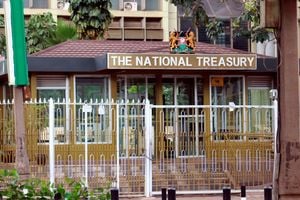
As the reality of a cash-starved economy has hit hard, the National Treasury has been less bullish.
Conditions were so tough that many workers in Nairobi and other major towns didn’t take the much-needed annual trip to the village last December, pointing to a bleak state of the economy that is now expected to have grown at the slowest pace in four years.
Using the annual urban-to-rural migration as a barometer for economic liquidity is the type of qualitative analysis better left to rumour mongers. But this was not street blabber, it was the assessment of the Executive Director of the Federation of Kenyan Employers (FKE) Jacqueline Mugo.
“A lot of our employees for the first didn’t even go home for Christmas,” said Mugo in a press briefing on Friday.
According to Ms Mugo, introduction of new deductions to support President William Ruto’s universal healthcare coverage and affordable housing programme has negatively affected the standard of living of most employees.
The statutory chops, most of which took effect in 2024, pushed average take-home for most workers to historic lows of 45 to 50 per cent of monthly earnings.
This left most them with little cash to spend on the annual migration to their rural homes to join their relatives for the festivities.
While critics might point to the numerous traffic snarls on major highways in December, data from the Kenya National Bureau of Statistics (KNBS) supports Mugo’s position.
Cross-country bus fares, not traffic snarl-ups, are more accurate signs of demand for transport services from urban areas to various villages in December. The higher the demand for transport services, the higher the prices or fares. True, matatu fares went up last December.
Charges from Nyali to Kisumu increased by 50 per cent to Sh3,300 from Sh2,200 in November. The average price of Sh3,000 in December last year was lower than Sh3,500 in the same month in 2022.
Things were different in 2022. As more Kenyans flocked to bus stations wanting to join their relatives upcountry, bus fares from Nyali to Kisumu shot up by 58 per cent compared to 50 per cent last month.
While some of the increase might be due to other factors such as higher fuel prices, the assumption is that inter-county matatu fares during the December holidays are mostly demand-driven.
Money is to the economy; what blood is to the human body. In the same way, the body suffers from various ailments whenever the circulation of blood is poor, the economy suffers when the flow of money is wanting.
As the reality of a cash-starved economy has hit hard, the National Treasury has been less bullish. It has slashed its projection of economic growth for 2024 by 60 basis points to 4.6 per cent from an earlier forecast of 5.2 per cent. This projection is unusually lower than that of the World Bank at 4.7 per cent.
In its 2024 Budget Policy Statement, the Treasury alluded to poor money supply as the main reason for the muted demand which, in turn, has led to slower economic growth.
Commercial banks’ lending to the private sector contracted by 1.1 per cent in the year to November 2024 on the back of high borrowing costs. You will have to back 22 years to the Daniel arap Moi era to find a time when credit extension to the private sector shrunk.
Mainly due to the poor credit uptake by the private sector—aggravated by higher interest rates by the Central Bank of Kenya (CBK) as it sought to combat higher consumer prices in the economy— Treasury was forced to revise downwards its growth estimate for 2024.
Without credit, most firms didn’t have money to start new investments or replenish their working capital and thus create additional jobs.
Left unsaid by the Treasury was the fact that increased deductions had also left workers with little money to spend, thus depressing consumption which in turn hurt businesses with some of them forced to close shop.
When the Kenya Kwanza government came up with its first revenue-raising measures in the Finance Bill of 2023, which introduced the 1.5 per cent affordable housing levy and doubled the value-added tax to 16 per cent, the World Bank noted that the new tax measures would erode the purchasing power of households in the medium term.










